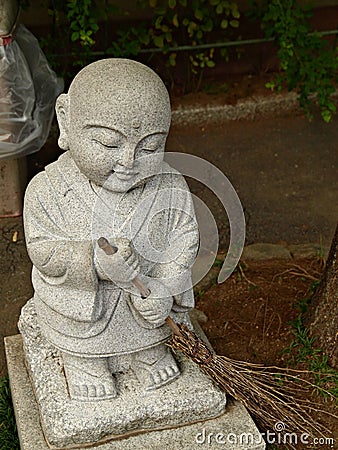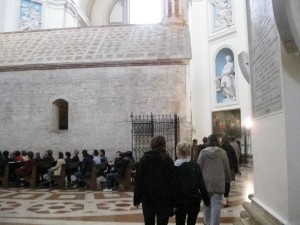Francis, having returned to
the church of blessed Mary of the Porziuncula, found Brother James the Simple
with a certain leper much ulcerated. For
Francis has commended that leper and all others to him, because he was as it
were their physician, and he freely touched their wounds and cleansed them and
took care of them, for then the friars used to abide in the hospitals of the
lepers.
But Francis said to Brother James, as if reproving him,
“You ought not to lead out these Christians, because it is neither decent for
you nor for them.” For though he wished
to serve them, he did not wish that those who were most afflicted to be taken
out of the hospital because people would be abhorred in seeing them. Brother James was so simple that he used to
go with them from the hospital to the church of St. Mary
After Francis had said this, he immediately blamed
himself, believing that the leper had been put to shame for the blame which he
had thrown on Brother James. Therefore,
desiring to satisfy God and the leper, he confessed to Brother Peter of Catana,
who was then Minister-General. And he
said, “I wish that you would confirm to me the penance which I have chosen to
do for this fault and that you would not contradict me.” He answered, “Brother, do as you please,” for
Brother Peter so venerated and feared him that he did not presume to contradict
him, even though Francis was often afflicted with guilt. Then Francis said, “Let this be my penance,
that I eat of the same dish as my Christian brother.”
Therefore,
when Francis sat down to the table with the leper and with other friars, one
dish was placed between Francis and the leper.
But the leper was all ulcerated and loathsome, and especially he had his
fingers shriveled and bleeding with which he took up lumps from the dish, so
that when he put them in the dish the blood and matter of the fingers flowed
into it. And, seeing this, Brother Peter
and the other friars were saddened, but did not dare to say anything on account
of the far and reverence of Francis. He
who saw this wrote it down and bears testimony of these things.
Mirror of Perfection, Section IV, Chapter 58
Francis, Francis. What am I going to do with you?
Francis' impulse was wonderful here. He wanted to feed and clean the lepers, and this was partly because of his own deep fear of lepers from a young age. Of course, we now know that leprosy (now called Hansen's Disease) isn't really contagious to adults. But in the ancient world, it was considered extremely contagious.
Francis was so mortified by his possible rejection of unity with his leper brother that he caused even MORE embarrassment to the leper by insisting that they ate of the same bowl, and then calling it "penance".
 Francis wanted to accept the outcast, especially the outcast he was particularly averse to. It is a good notion, but what is more important that we love all the outcast, which means radical acceptance, even in the fact of society's rejection. The mentally ill, the homeless, homosexuals, felons, and all others that are rejected by society, we need to go out of our way to accept. Not in a halfhearted way, like Francis, but with full love, and full joy. This doesn't mean we don't take care to not recognize the weaknesses of those we accept-- whether it be contagion or potential criminal behavior. But we find ways to make our friends be comfortable and helped in as much as we can.
Francis wanted to accept the outcast, especially the outcast he was particularly averse to. It is a good notion, but what is more important that we love all the outcast, which means radical acceptance, even in the fact of society's rejection. The mentally ill, the homeless, homosexuals, felons, and all others that are rejected by society, we need to go out of our way to accept. Not in a halfhearted way, like Francis, but with full love, and full joy. This doesn't mean we don't take care to not recognize the weaknesses of those we accept-- whether it be contagion or potential criminal behavior. But we find ways to make our friends be comfortable and helped in as much as we can.



